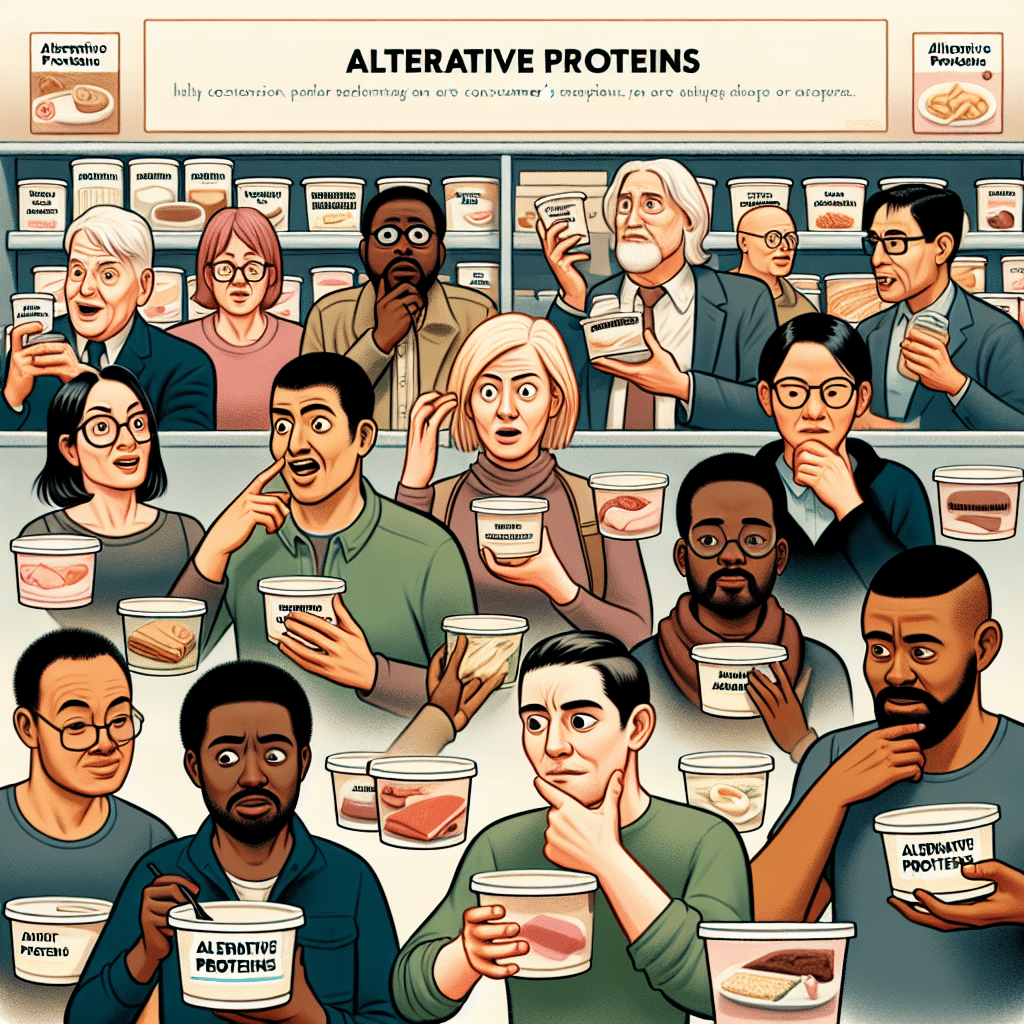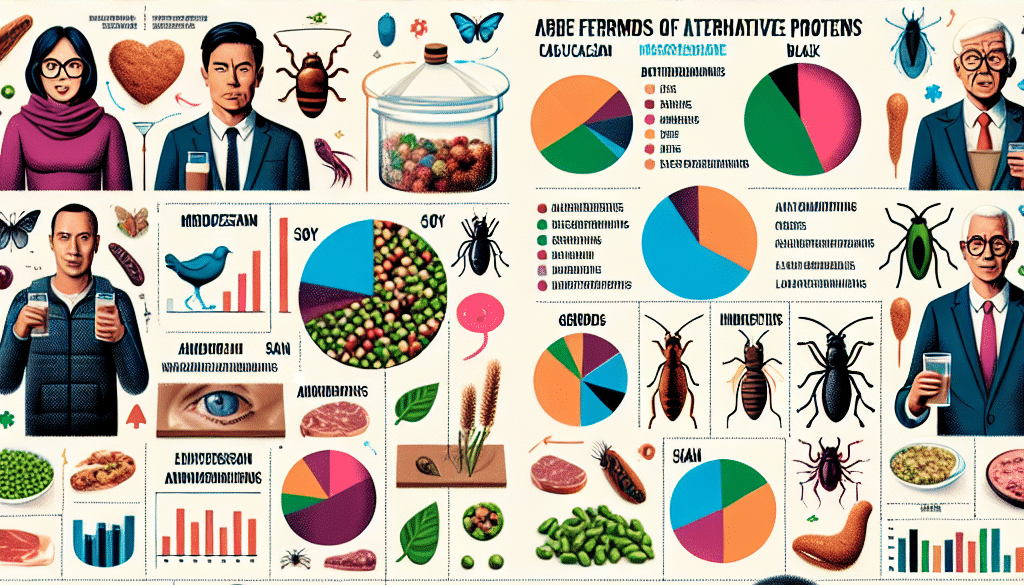Alternative Proteins: Consumers’ Perceptions Analyzed
-
Table of Contents
- Alternative Proteins: Analyzing Consumer Perceptions and Trends
- Understanding Alternative Proteins
- Consumer Drivers for Alternative Protein Adoption
- Perceptions and Attitudes Towards Alternative Proteins
- Health and Nutrition
- Environmental Impact
- Taste and Culinary Experience
- Economic Considerations
- Case Studies and Statistics
- Challenges and Opportunities
- Conclusion: The Future of Food
- Discover ETprotein’s High-Quality Alternative Proteins
Alternative Proteins: Analyzing Consumer Perceptions and Trends

The global food landscape is undergoing a significant transformation as consumers increasingly seek sustainable and health-conscious alternatives to traditional animal proteins. Alternative proteins, derived from plants, insects, algae, or cultivated in labs, are gaining traction. This shift is not only driven by personal health concerns but also by the growing awareness of the environmental impact of conventional livestock farming. In this article, we delve into consumer perceptions of alternative proteins, exploring the factors influencing their choices and the implications for the food industry.
Understanding Alternative Proteins
Before we analyze consumer perceptions, it’s essential to understand what alternative proteins are and the variety available in the market. Alternative proteins can be broadly categorized into plant-based proteins, insect-based proteins, cultured or lab-grown meats, and proteins derived from fungi or algae. Examples include soy, pea, and rice proteins, as well as more novel sources like cricket flour or lab-cultured beef.
Consumer Drivers for Alternative Protein Adoption
Several factors are driving consumer interest in alternative proteins:
- Health Concerns: Many consumers turn to plant-based proteins to reduce their intake of saturated fats and cholesterol associated with animal products.
- Environmental Awareness: The knowledge that livestock farming is a significant contributor to greenhouse gas emissions is prompting consumers to seek more eco-friendly options.
- Animal Welfare: Ethical concerns about the treatment of animals in the food production system influence some consumers to choose alternative proteins.
- Novelty and Taste: The curiosity to try new foods and the improvement in taste and texture of alternative protein products are also attracting consumers.
Perceptions and Attitudes Towards Alternative Proteins
Consumer perceptions of alternative proteins vary widely, influenced by cultural, demographic, and individual factors. Here’s a closer look at these perceptions:
Health and Nutrition
Many consumers perceive alternative proteins as healthier options. Plant-based proteins, in particular, are often associated with a clean label, being non-GMO, and free from antibiotics and hormones. However, there is still some skepticism regarding the nutritional completeness of these proteins compared to their animal counterparts.
Environmental Impact
As environmental concerns become more mainstream, consumers are increasingly recognizing the lower carbon footprint of alternative proteins. This positive perception is bolstered by numerous studies and campaigns highlighting the sustainability benefits of plant-based diets.
Taste and Culinary Experience
The taste has historically been a barrier to the adoption of alternative proteins. However, advancements in food technology have led to significant improvements in flavor and texture, making them more palatable to a broader audience. The success of products like the Impossible Burger and Beyond Meat demonstrates this shift in consumer acceptance.
Economic Considerations
Price remains a critical factor in consumer decision-making. Alternative proteins can be more expensive than traditional meat, which may limit their appeal to price-sensitive consumers. However, as production scales up and becomes more efficient, prices are expected to decrease.
Case Studies and Statistics
Several case studies and market research reports provide insights into consumer perceptions of alternative proteins:
- A study by the Good Food Institute revealed that nearly 40% of Americans are willing to try clean meat, citing curiosity, health benefits, and environmental reasons.
- According to a report by MarketsandMarkets, the global plant-based protein market is projected to grow from USD 10.3 billion in 2020 to USD 14.5 billion by 2025, indicating a growing consumer base.
- Euromonitor International reported that 24% of global consumers are trying to limit their meat intake, with health being the primary motivator.
Challenges and Opportunities
Despite the growing interest in alternative proteins, there are challenges to overcome:
- Perception of Processed Foods: Some consumers view alternative proteins as overly processed, which can be a deterrent for those seeking whole food options.
- Cultural and Traditional Preferences: In many cultures, meat plays a central role in culinary traditions, which can slow the adoption of alternative proteins.
- Regulatory Hurdles: The regulation of lab-grown meats and novel protein sources is still evolving, which can impact consumer trust and market entry.
However, these challenges also present opportunities for innovation, education, and collaboration within the food industry to address consumer concerns and promote the benefits of alternative proteins.
Conclusion: The Future of Food
Consumer perceptions of alternative proteins are complex and multifaceted, influenced by a range of factors from health and sustainability to taste and cost. While there are challenges to address, the trend towards alternative proteins is clear, with significant growth potential for the industry. As consumers become more educated and products continue to improve in quality and affordability, alternative proteins are likely to become a staple in diets worldwide.
Discover ETprotein’s High-Quality Alternative Proteins
If you’re looking to incorporate alternative proteins into your diet or product offerings, ETprotein is an excellent choice. Their extensive range of organic bulk vegan proteins and L-(+)-Ergothioneine (EGT) products cater to various industries, ensuring you have access to high-quality, sustainable protein sources. With a commitment to non-GMO, allergen-free ingredients, and high purity levels, ETprotein stands out as a leader in the alternative protein market.
About ETprotein:
ETprotein, a reputable protein and L-(+)-Ergothioneine (EGT) Chinese factory manufacturer and supplier, is renowned for producing, stocking, exporting, and delivering the highest quality organic bulk vegan proteins and L-(+)-Ergothioneine. They include Organic rice protein, clear rice protein, pea protein, clear pea protein, watermelon seed protein, pumpkin seed protein, sunflower seed protein, mung bean protein, peanut protein, and L-(+)-Ergothioneine EGT Pharmaceutical grade, L-(+)-Ergothioneine EGT food grade, L-(+)-Ergothioneine EGT cosmetic grade, L-(+)-Ergothioneine EGT reference grade and L-(+)-Ergothioneine EGT standard. Their offerings, characterized by a neutral taste, non-GMO, allergen-free attributes, with L-(+)-Ergothioneine purity over 98%, 99%, cater to a diverse range of industries. They serve nutraceutical, pharmaceutical, cosmeceutical, veterinary, as well as food and beverage finished product distributors, traders, and manufacturers across Europe, USA, Canada, Australia, Thailand, Japan, Korea, Brazil, and Chile, among others.
ETprotein specialization includes exporting and delivering tailor-made protein powder and finished nutritional supplements. Their extensive product range covers sectors like Food and Beverage, Sports Nutrition, Weight Management, Dietary Supplements, Health and Wellness Products, and Infant Formula, ensuring comprehensive solutions to meet all your protein needs.
As a trusted company by leading global food and beverage brands and Fortune 500 companies, ETprotein reinforces China’s reputation in the global arena. For more information or to sample their products, please contact them and email sales(at)ETprotein.com today.














